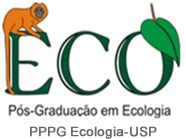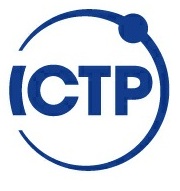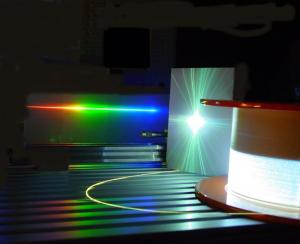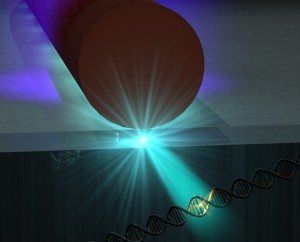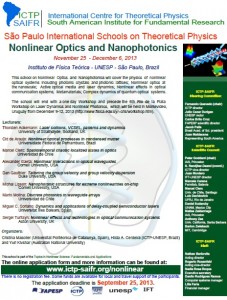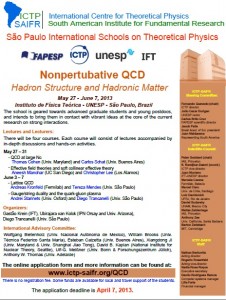Search Results
Accommodation
QGSCVI will take place at the
Beach Hotel Maresias
Rua Francisco Loup, 1109, Maresias, São Paulo
a small seaside town 180 Km from Sao Paulo. A number of bedrooms have been blocked for the conference with the following rates per day (in Brazilian reais with an exchange rate of approximately 2 reais = 1 US dollar) :
| Single | Double* | Triple* | |
| Estrela do Mar bedroom | 280 | 170 | 155 |
| Boto bedroom | 250 | 150 | 135 |
| Cavalo Marinho bedroom | 230 | 140 | —– |
* per person
The price includes accomodation, breakfast, lunch and dinner. Extra expenses (like drinks and phone calls) will have a 10% tax charge. Wi-fi and parking not included.
Reservations by email at eventos@maresiashotel.com.br or by phone +55 (12) 3891-7500/7506.
Please do not forget to state which type of bedroom you wish to book!
Continue Reading | Comments Off on Accommodation
Past QGSC
QGSC V (Buenos Aires)
QGSC IV (Punta Del Este)
QGSC III (Valdivia)
QGSV II (Bariloche)
QGSC I (Punta Del Este)
Continue Reading | Comments Off on Past QGSC
Journal Club and Seminars on Particle Phenomenology
The Journal Club on Particle Phenomenology takes place usually on Thursdays at 10:30am (in lecture room #2). In general it is divided in two parts:
1) The “what got me interested this week” part, in which people comment on papers they have found recently but not necessarily read. The idea is to have a quick pass at the level of the abstract of the paper, so we are up to date and can see if anyone is interested in reading some of the papers in more depth (which leads us to the second part)
2) Someone leads a deeper discussion of a single paper. The idea is to have someone on the blackboard presenting the paper, but the audience is also supposed to have read it. These papers will be selected with as much antecedence as possible, possibly selected from ones selected from the first part of the JCs.
The Seminars on Particle Phenomenology are scheduled according to the possibility of speakers to give specialized talks on their recent work.
Schedule
(Otherwise stated, it takes place at 10:30am in room #2)
| DATE | SPEAKER | TITLE | REFERENCE |
| 05/02
|
Eduardo Ponton | Loop-induced Higgs couplings in WED | 1301.7692
1204.0008 1006.5939 |
| 14/03 | Ricardo Matheus | Full-hierarchy Quiver Theories of Electroweak Symmetry Breaking and Fermion Masses | 1210.5568 |
| 21/03 | Rogerio Rosenfeld | The universal Higgs fit | 1303.3570 |
|
28/03 |
Adriano Natale | The 125 GeV boson: A composite scalar? | 1303.3248 |
| 18/04 | Raphael Albuquerque | Massive Nambu-Goldstone bosons | 1303.1527 |
| 19/04 2pm room #3 |
Z. Chacko
[Seminar] |
The Dilaton, the Radion and Duality | 1304.1795
1209.3259 |
Continue Reading | Comments Off on Journal Club and Seminars on Particle Phenomenology
Energetic Approach to Food Webs
Start time: June 17
Ends on: June 21
Venue: São Paulo, Brazil
Organizers: Roberto A. Kraenkel (IFT-UNESP), Paulo Inácio Prado (IB-USP), Lucas Faria (UFLA)
Lecturers: Kevin McCann and Gabriel Gellner (Guelph University, Canada)
Lecture 1: The Dynamics of the C-R model: The Base Module for Food Webs (McCann)
Lecture 2: Stabilizing Mechanisms and Food Web Modules (McCann)
Lecture 3: Food Webs in Space (McCann)
Lecture 4: The Statistical Mechanics of Whole Food Webs (Gellner)
Description:
This course will look at the role energetics play in mediating the structure and dynamics of consumer-resource interactions. We will unfold a simple set of principles on the role of energy in simple food web modules before exploring this framework in more complex food webs.
This course will emphasize, where possible, the interaction between theory and data. Additionally, lectures will be broken up into a lecture section and a lab section, which will have material that allows students to explore the dynamics within a “computer laboratory” setting (run by Kevin McCann and Gabriel Gellner).
The main reference of this course is the recently (2011) published book by Kevin S. MacCann, “Food Webs”, which appeared in the Monographs on Population Biology, published by the Princeton University Press.
List of Participants:
List of Participants Updated on June 7
Ground transportation instruction:
From Guarulhos Airport to Blair House Flat
From Blair House Flat to the institute
Bela Cintra Flat instruction
Upon arrival information:
General Information sheet
Course Material:
– Consumer-Resource Interactions Data
– Introducing the Theory of Single Population Dynamics
– The Theory of Consumer-Resource Interactions
Photos
Student evaluations of school:
– Student evaluations of school
Programme: PDF Version updated on June 10
|
June 17 to 21 |
|
|
Monday, June 17 |
|
|
8:00 – 9:30 |
Registration |
|
9:30 – 12:00 |
|
|
12:00 – 14:00 |
Lunch |
|
14:00 – 17:00 |
Practice/Study |
|
|
|
|
Tuesday, June 18 |
|
|
9:30 – 12:00 |
|
|
Afternoon |
FREE |
|
|
|
|
Wednesday, June 19 |
|
|
9:30 – 12:00 |
Master class presentations |
|
12:00 – 14:00 |
Lunch |
|
14:00 – 17:00 |
Master class presentations |
|
|
|
|
Thursday, June 20 |
|
|
9:30 – 12:00 |
Lecture III |
|
12:00 – 14:00 |
Lunch |
|
14:00 – 17:00 |
Practice/Study |
|
|
|
|
Friday, June 21 |
|
|
9:30 – 12:00 |
Lecture IV |
|
12:00 – 14:00 |
Lunch |
|
14:00 – 17:00 |
Master class presentations |
This programme might have a few adjustments during the course.
Continue Reading | Comments Off on Energetic Approach to Food Webs
School on Nonlinear Optics and Nanophotonics
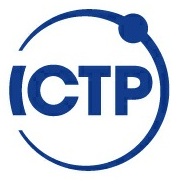 —————– — 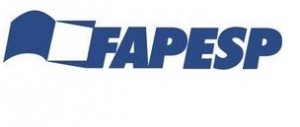
|
Start time: November 25Ends on: December 6Venue: IFT-UNESP. São Paulo, Brazil
Organizers: Cristina Masoller (Universitat Politècnica de Catalunya, Spain), Hilda A. Cerdeira (ICTP-SAIFR, Brazil), and Yuri Kivshar (Australia National University) Lecturers: – Thorsten Ackemann (University of Strathclyde, Scotland, UK) – Cid de Araujo (Universidade Federal de Pernambuco, Brazil)– – Marcel Clerc (Universidad de Chile) – Alexander Gaeta (Cornell University, USA) – Dan Gauthier (Duke University, USA) – Michal Lipson (Cornell University, USA) – Mario Molina (Universidad de Chile) – Miguel C. Soriano (Universitat IIles Balear, Spain) – Sergei Turitsyn (Aston University, UK) This is the first of a series of events on Topics in Nonlinear Science: Fundamentals and Applications, locally coordinated by Hilda A. Cerdeira. Description: This school on Nonlinear Optics and Nanophotonics will cover the physics of nonlinear optical systems including photonic cyrstals and photonic lattices; Nonlinear optics at the nanoscale; Active optical media and laser dynamics; Nonlinear effects in optical communication systems; Metamaterials; Complex dynamics of quantum optical systems.
Application Deadline, September 25 Announcement
|
Continue Reading | Comments Off on School on Nonlinear Optics and Nanophotonics
Quantum Gravity in the Southern Cone VI
| Conference Poster | Registration Form | Transportation | Program | Past QGSC | Accommodation | List of Registrants | Arrival Instructions |
Start time: September 11
Ends on: September 14
Venue: Beach Hotel Maresias, Maresias, São Paulo, Brazil
Description: Quantum mechanics and general relativity are among the most successful theories ever constructed in physics. When they are combined to describe quantum gravity several problems arise. This meeting will provide a place for physicists from different communities to present their findings.
Organizers: Rodolfo Gambini (Universidad de la Republica, Montevideo), Carmen Núñez (Universidade de Buenos Aires and IAFE, Buenos Aires), Jorge Pullin (Louisiana State University), Victor Rivelles (Universidade de São Paulo), Jorge Zanelli (CECS, Valdivia and Universidade Nacional Andres Bello)
Speakers:
Gerardo Aldazabal (CA Bariloche)
Jorge Alfaro (PUC, Santiago)
Abhay Ashtekar (Penn State U.)
Max Banãdos (PUC, Santiago)
Nathan Berkovits (ICTP-SAIFR/IFT-UNESP)
Steven Carlip (U. Calif. at Davis)
Marc Casals (CBPF Rio de Janeiro)
Diego Correa (U. La Plata)
Bianca Dittrich (Perimeter & MPI Potsdam )
Jose Edelstein (Santiago de Compostela U.)
Gaston Giribet (U. Buenos Aires)
Alejandro Perez (CPT Marseille)
Aleksandr Pinzul (U. Brasilia)
Martin Reuter (I. Physics, U. Mainz)
Jorge Russo (ICREA, Barcelona)
Kelly Stelle (Imperial College)
Daniel Sudarksy (UNAM, Mexico City)
Diego Trancanelli (USP Sao Paulo)
Olivera Miskovic (Pontificia Universidad Catolica de Valparaiso)
New!! Confirmed List of Participants and Speakers: Updated on Sept 3
Registration deadline: June 30, 2013
Registration fee: R$ 30 for students and R$ 60 for all other participants. It must be paid in cash upon arrival at the conference.
Financial help: We may be able to provide financial help for some Latin-American participants. After registering please send an email to rivelles@fma.if.usp.br stating your needs. Participants from São Paulo state must apply until June 1, 2013.
Continue Reading | Comments Off on Quantum Gravity in the Southern Cone VI
Nonpertubative QCD: Hadron Structure and Hadronic Matter
 — 
|
Start time: May 27Ends on: June 7 Venue: Instituto de Física Teórica – UNESP – São Paulo, Brazil Organizers: Gastão Krein (IFT), Ubirajara van Kolck (IPN Orsay and Univ. Arizona), Diego Trancanelli (Univ. São Paulo) Lecturers and lectures:–There will be four courses. Each course will consist of lectures accompanied by in-depth discussions and hands-on activities.
– May 27 – 31
Thomas Cohen (Univ. Maryland) and Carlos Schat (Univ. Buenos Aires)
Aneesh Manohar (UC San Diego) and Christopher Lee (Los Alamos) – June 3 – 7
Andreas Kronfeld (Fermilab) and Tereza Mendes (Univ. São Paulo)
Andrei Starinets (Univ. Oxford) and Diego Trancanelli (Univ. São Paulo) International Advisory Committee: Wolfgang Bietenholz (Univ. Nacional Autónoma de Mexico), William Brooks (Univ. Técnica Federico Santa María), Esteban Calzetta (Univ. Buenos Aires), Xiangdong Ji (Univ. Maryland & Univ. Shanghai Jiao Tong), David B. Kaplan (National Institute for Nuclear Theory, Seattle), Ulf-G. Meißner (Univ. Bonn & Forschungszentrum Jülich), Anthony W. Thomas (Univ. Adelaide) Description: The school is geared towards advanced graduate students and young postdocs, and intends to bring them in contact with vibrant ideas at the core of the current research on strong interactions. Announcement◊ List of Participants: List of Participants_Updated on May 23
◊Accommodation: Participants whose accommodation has been arranged by the institute will stay at Blair House Flat, Bela Cintra Flat and Turiassu Hotel* (Turiassu Hotel 2nd week only). Each participant whose accommodation has been arranged by the institute has received the details about the accommodation individually. ◊ Registration for participants who will stay at Blair House Flat: ALL participants should register. Participants who will stay at Blair House Flat can complete the registration procedure on May 26 from 5 to 7 pm. Participants who will stay at Blair House Flat but will arrive later, can register on May 27 at the institute. The registration at the institute will be on May 27 from 8am to 9:30am. Upon registration, please bring a copy of your ID or passport. ◊Participants who live in São Paulo or have accommodation arranged on their own: We ask you to kindly arrive at IFT-UNESP (Rua Dr. Bento Teobaldo Ferraz, 271 Bloco 2 4th floor, in front of Terminal Barra-Funda) on May 27 between 8 – 9:30am in order to complete the registration form and to collect the school material. You can find arrival instruction at http://www.ictp-saifr.org/?page_id=195. ◊Participants who will stay at Bela Cintra Flat can also complete the registration procedure at the institute on May 27, and participants who will stay at Turiassu Hotel can complete the registration on June 3. BOARDING PASS – All participants, whose travel has been provided by the institute, should bring the boarding pass upon registration, and collect an envelope to send the return boarding pass to the institute. ◊Ground transportation instruction: From Guarulhos Airport to Blair House Flat From Blair House Flat to the institute From Turiassu Hotel to the institute ◊Upon arrival information: General Information sheet PhotosStudent evaluations of school:
|
||||||||||||||||||||||||||||||||||||||||||||||||||||||||||||||||||||||||||||||||||||||||||||||||||||||||||||||||||||||||||||||||||||||||||||||||||||||||||||||||||||||||||||||||||||||||||||||
|
FIRST WEEK: May 27 to 31 |
|
|
Monday, May 27 |
|
|
8:00 – 9:30 |
Registration |
|
9:30 – 11:00 |
Cohen I [Video] |
|
11:00 –11:30 |
Coffee break |
|
11:30 –13:00 |
Manohar I [Video] |
|
13:00 – 14:30 |
Lunch |
|
14:30 – 16:00 |
Hands-on activity – Schat I |
|
16:00 – 16:30 |
Coffee break |
|
16:30 – 19:00 |
Hands-on activity – Lee I |
|
Tuesday, May 28 |
|
|
9:30 – 11:00 |
Cohen II [Video] |
|
11:00 – 11:30 |
Coffee break |
|
11:30 – 13:00 |
Manohar II [Video] |
|
13:00 – 14:30 |
Lunch |
|
14:30 – 16:00 |
Hands-on activity – Schat II |
|
16:00 – 16:30 |
Coffee break |
|
16:30 – 19:00 |
Hands-on activity – Lee II |
|
Wednesday, May 29 |
|
|
9:30 – 11:00 |
Cohen III [Video] |
|
11:00 – 11:30 |
Coffee break |
|
11:30 – 13:00 |
Manohar III[Video] |
|
13:00 – 14:30 |
Lunch |
|
14:30 – 16:00 |
Hands-on activity – Schat III |
|
16:00 – 16:30 |
Coffee break |
|
16:30 – 19:00 |
Hands-on activity – Lee III |
|
Thursday, May 30 |
|
|
9:30 – 11:00 |
Cohen IV |
|
11:00 – 11:30 |
Coffee break |
|
11:30 – 13:00 |
Manohar IV |
|
13:00 – 14:30 |
Lunch |
|
14:30 – 16:00 |
Hands-on activity – Schat IV |
|
16:00 – 16:30 |
Coffee break |
|
16:30 – 19:00 |
Hands-on activity – Lee IV |
|
Friday, May 31 |
|
|
9:30 – 11:00 |
Cohen V |
|
11:00 – 11:30 |
Coffee break |
|
11:30 – 13:00 |
Manohar V |
|
13:00 – 14:30 |
Lunch |
|
14:30 – 16:00 |
Hands-on activity – Schat V |
|
16:00 – 16:30 |
Coffee break |
|
16:30 – 19:00 |
Hands-on activity – Lee V |
|
Saturday and Sunday |
|
|
FREE |
|
|
SECOND WEEK: June 3 to 7 |
|
|
Monday, June 3 |
|
|
9:30 – 11:00 |
Kronfeld I |
|
11:00 – 11:30 |
Coffee break |
|
11:30 – 13:00 |
Starinets I |
|
13:00 – 14:30 |
Lunch |
|
14:30 – 16:00 |
Hands-on activity – Mendes I |
|
16:00 – 16:30 |
Coffee break |
|
16:30 – 19:00 |
Hands-on activity – Trancanelli I |
|
Tuesday, June 4 |
|
|
9:30 – 11:00 |
Kronfeld II |
|
11:00 –11:30 |
Coffee break |
|
11:30 –13:00 |
Starinets II |
|
13:00 – 14:30 |
Lunch |
|
14:30 – 16:00 |
Hands-on activity – Mendes II |
|
16:00 – 16:30 |
Coffee break |
|
16:30 – 19:00 |
Hands-on activity – Trancanelli II |
|
Wednesday, June 5 |
|
|
9:30 – 11:00 |
Kronfeld III |
|
11:00 –11:30 |
Coffee break |
|
11:30 –13:00 |
Starinets III |
|
13:00 – 14:30 |
Lunch |
|
14:30 – 16:00 |
Hands-on activity – Mendes III |
|
16:00 – 16:30 |
Coffee break |
|
16:30 – 19:00 |
Hands-on activity – Trancanelli III |
|
Thursday, June 6 |
|
|
9:30 – 11:00 |
Kronfeld IV |
|
11:00 –11:30 |
Coffee break |
|
11:30 – 13:00 |
Starinets IV |
|
13:00 – 14:30 |
Lunch |
|
14:30 – 16:00 |
Hands-on activity – Mendes IV |
|
16:00 – 16:30 |
Coffee break |
|
16:30 – 19:00 |
Hands-on activity – Trancanelli IV |
|
Friday, June 7 |
|
|
9:00 – 10:30 |
Kronfeld V |
|
10:30 –11:00 |
Coffee break |
|
11:00 –12:30 |
Starinets V |
|
12:30 – 13:30 |
Lunch |
|
13:30 – 15:00 |
Hands-on activity – Mendes V |
|
15:00 – 15:15 |
Coffee break |
|
15:15 – 16:30 |
Hands-on activity – Trancanelli V |
Continue Reading | Comments Off on Nonpertubative QCD: Hadron Structure and Hadronic Matter
Corrigan minicourse on classical and quantum integrability
Speaker: Edward Corrigan (York University)
Title: Aspects of classical and quantum integrability
Description: The purpose of these lectures is to give an introduction to some of the ideas that underpin the notion of integrability, both its classical origins and properties within systems with finitely many degrees of freedom or nonlinear two-dimensional field theories such as sine-Gordon or Toda field theory, together with some of the methods used to determine properties of the associated quantum field theories, such as their spectrum of states and scattering. More recently investigated properties of systems with one or two boundaries, or containing impurities or defects will be discussed briefly. It is intended to keep the presentation at a level suitable for those with no previous experience of the topics yet also to provide some reasonably detailed examples alongside a broader perspective.
Lecture 1: Tuesday April 9, 10:30-12:00, Sala 3
Lecture 2: Thursday April 11, 10:30-12:00, Sala 3
Lecture 3: Tuesday April 16, 10:30-12:00, Sala 3
Lecture 4: Thursday April 18, 10:30-12:00, Sala 3
Continue Reading | Comments Off on Corrigan minicourse on classical and quantum integrability
Rafael Porto minicourse on gravitational waves
Speaker: Rafael Porto (IAS, Princeton)
Title: The effective field theory (EFT) approach to gravitational dynamics: from black holes to cosmology
All lectures will be in the IFT-UNESP auditorium
Wednesday, Nov. 28, 16:00-18:00
Lecture 1 – Preamble: EFTs in QCD
Video 1
Video 2
Thursday, Nov. 29, 16:00-18:00
Lecture 2 – The two-body problem in General Relativity
Video 1
Friday, Nov. 30, 16:00-18:00
Lecture 3 – The EFT for gravitational wave radiation
Video 1
Video 2
Monday, Dec. 3, 10:00-12:00
Lecture 4 – Applications to the binary inspiral problem
Video 1
Video 2
Tuesday, Dec. 4, 10:00-12:00
Lecture 5 – Physics of the early Universe: The Inflationary paradigm and primordial perturbations
Video 1
Video 2
Wednesday, Dec. 5, 10:00-12:00
Lecture 6 – The EFT of inflation
Video 1
Video 2
Continue Reading | Comments Off on Rafael Porto minicourse on gravitational waves
Boris Kayser minicourse/workshop on particle physics
Major Questions and Issues in Particle Physics
Monday, October 22 – Sala 1 (third floor)
10:00 – 12:00 Lecture 1 of Boris Kayser: “Leptogenesis”
12:00 – 15:00 Lunch
15:00 – 15:20 Vicente Pleitez (IFT-UNESP) “Exotic neutrinos in a B-L model”
15:25 – 15:45 Ana Machado (UFABC) “Neutrinos quasi Dirac and the U_13”
15:50 – 16:10 Fernando Torres (IFT-UNESP) “Quasi-Dirac Neutrinos in the solar context”
16:15 – 16:35 Orlando Peres (IFGW-Unicamp) “Fishing Sterile Neutrino in ICE-CUBE”
16:40 – 17:00 Celso Nishi (UFABC) “S_4 flavors CP symmetry for neutrinos”
17:00 – 17:30 Coffee break
17:30 – 19:00 Roundtable discussion
Tuesday, October 23 – Sala 1 (third floor)
10:00 – 12:00 Lecture 2 of Boris Kayser: “Tensions With the Three-Neutrino Picture”
12:00 – 14:00 Lunch
14:00 – 14:20 Florencia Vieyro (IAR-Conicet / IFGW) “Neutrino emission from Pop III Gamma-Ray Bursts”
14:25 – 14:45 Célio Moura (UFABC) “Search for extra-galactic neutrinos”
14:50 – 15:10 Mauro Tonasse (IFT-UNESP) “Dark matter from a B-L Model – I”
15:15 – 15:35 Elaine Fortes (IFT-UNESP) “Dark matter from a B-L Model – II”
15:40 – 16:00 Closing session
Videos
22/10 – Video 1
22/10 – Video 2
23/10 – Video 1
23/10 – Video 2
23/10 – Video 3
Continue Reading | Comments Off on Boris Kayser minicourse/workshop on particle physics
